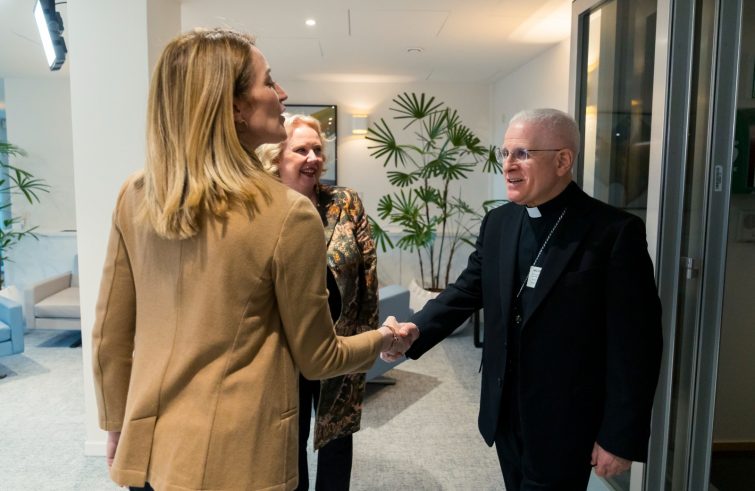
“Europe and the Mediterranean share a common past and a common present, both look forward to renewed ties based on solidarity and peace.” Speaking to SIR, Monsignor Mariano Crociata, President of the Commission of the Bishops’ Conferences of the European Union (COMECE), outlined the “reasons” for the meeting held yesterday at the European Parliament between a delegation from the Mediterranean Youth Council and the President of the European Parliament, Roberta Metsola. The youth delegation was accompanied in Brussels by Msgr. Giuseppe Baturi, Secretary General of the Italian Bishops’ Conference. The Nuncio to the EU, Msgr. Noel Treanor, and MEP Beatrice Covassi, who is hosting the initiative, also attended the meeting with President Metsola. A public event on “Building bridges of dialogue, unity and peace between peoples and cultures” is planned for the morning of Thursday 4 April. The Mediterranean Youth Council was set up following the meeting of the Bishops and Mayors of the Mediterranean region which took place in Florence from February 23-27, 2022. The Council comprises more than 30 young men and women from 19 Mediterranean countries.
Monsignor Crociata, can you tell us about the meeting you had with President Metsola? What was the purpose of this meeting? What was the aim?
To begin with, as you know, the Italian Bishops’ Conference promoted the creation of a Mediterranean Youth Council, with headquarters in Fiesole, as a result of the meetings entitled “For a Mediterranean of peace”. It is the fruit of meetings held first in Bari and most recently in Marseille.
Giving a European dimension to this initiative is the purpose of this visit to Brussels. Europe and the Mediterranean region share a common past and a common present and are looking forward to renewed ties based on solidarity and peace.
President Metsola is well aware of all this, and her meeting with the young people took place in a very welcoming and cordial atmosphere.
What is it that young people expect from this sea, which has unfortunately and all too often become an open-air cemetery? Those who cross it at the risk of their lives are also young people. What is Europe’s response to the “voice” of young people?
The intuition to dedicate a project to the young people of the various Mediterranean countries and to their Churches is of great value. It encourages them in their quest and their desire to construct, in their role as believers, a future of friendship and peace between peoples and between the faithful.
Young people are especially sensitive to the tragedies of our time, especially those that are unfolding in the Mediterranean (“Mare Nostrum”). They, in turn, are driven by a strong need for reflection, interaction, exchange of ideas and initiatives that promote sharing and mutual understanding in order to build a future of peace.
What were the outcomes of the Mediterranean meetings in Bari, Florence and in Marseilles with Pope Francis? What is the way forward for the Churches of the Mediterranean?
In Marseilles, participants discussed the idea of a Conference of Mediterranean Churches. We are currently in the midst of a process of reflection that the Pope is following and encouraging. What is certain is that we live in an age in which the Church can no longer shut herself out, ignoring what is happening next-door. The tragedies of our time – just like the successes and opportunities – call for openness and cooperation.
The young recognize this with a vivid awareness and enthusiasm. They are the vanguard of a path that we should all follow.









